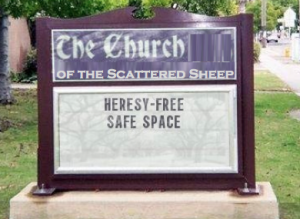Romans 16:17-18 says, “Now I beseech you, brethren, mark them which cause divisions and offences contrary to the doctrine which ye have learned; and avoid them. For they that are such serve not our Lord Jesus Christ, but their own belly; and by good words and fair speeches deceive the hearts of the simple.”
Berean Research finds it necessary at times to name names and warn our readers about false teachings happening in church pulpits, popular books, blogs and social media, conference presentations and more. We do this by gently comparing these teachings to what the Bible has to say. Quite often some of our readers express anger at this, and we take no pleasure in having to report and warn about folks who twist God’s Word or who are partnering with known false teachers. Sometimes we are accused of “guilt by association,” which we understandably try to avoid. But when it comes to affiliation, or actually partnering with these known false teachers, we do need to call it out.
Over at Christian Research Network, Renew America‘s Marsha West pens an excellent warning about holding up celebrity Christians as folks who may not be challenged ever – even holding up their teachings and behavior to the light of Scripture. But as discerning Christians, shouldn’t we always compare what we hear, see, read and consume to God’s Word? That is exactly what the Bereans did with Paul’s teachings in Acts 17:11.
Says West, “Revealing the names of people who lead us down the primrose path is not just scriptural, it is imperative that the Body of Christ know who the culprits are. So hold on to your hats while I expose two women you need to know about. Even though both are best-selling authors, speakers, and are frequent guests on popular podcasts, some of the people they laud are dangerous heretics, i.e. wolves in sheep’s clothing.”
Hold onto your hats is right. The two women West examines are beloved indeed, and they are true sisters in Christ. I would not categorize them as wolves in sheep’s clothing, but as teachers whom we must examine for ourselves and pray that the Lord opens their eyes to what the Bible has to say about some of the things they teach and the resources they use to do so.
With that, here is a snippet of West’s article titled, Some beloved Christian VIPs navigate the sheep down the primrose path that can lead to a life of sin, used with permission:

Many who claim to be followers of Christ are completely oblivious to what a Christian worldview should look like, and from my experience many simply don’t care, even though the Bible has a ton to say on this subject. Those who read and study the Bible are few and far between….including people who say they love Jesus, attend church, wear crosses, and get Bible verses tattooed on their bodies.

I’ve asked these questions umpteen times but I’m going to ask them again: where does a person discover the truth about God’s only begotten Son? Where does a person discover what they need to know about the work of the Holy Spirit? How will those who profess a belief in Jesus Christ know how to live a life that’s pleasing to Him? The answer to these questions is that believers must read the Holy Spirit inspired Bible.
In the pages of Scripture God makes it clear that His chosen ones are to have nothing to do with pagan and apostate religions and yet many self-professed followers of Jesus do the exact opposite of what God requires of them.
As you are about to see, even highly regarded Christian leaders and clergy sometimes toss discernment out the window for reasons known only to them.
Desert Fathers Leave Protestants High And Dry
Most Evangelicals aren’t familiar with Henri Nouwen. And why would they be? He was a Roman Catholics priest. A number of years ago I addressed my concerns about Catholic mystic priests in The Low-Information Evangelical because quite a few prominent Christians were quoting from and recommending books by Catholic Trappist monks dubbed the “Desert Fathers.” The names most recommended at the time were Meister Eckhart, Ignatius of Loyola, St. John of the Cross, Teresa of Avila as well as priests who took up where they left off: Thomas Merton, Thomas Keating, William Meninger, Basil Pennington and Henri Nouwen. As time goes by, more names have come to my attention. One man who’s now on my radar is Brother Lawrence. The reason for this addition is because in Joni Eareckson Tada’s recently published devotional, The Practice of the Presence of Jesus: Daily Meditations on the Nearness of Our Savior, he is referenced and quoted. Amazon’s promo says this about Joni’s book:
Discover the joy of intentionally dwelling in the presence of God as the beloved author of Joni weaves contemporary insights with the timeless wisdom of seventeenth-century monk Brother Lawrence.
Review by Philip Ryken, president of Wheaton College:
The Practice of the Presence of Jesus celebrates the legacy of Brother Lawrence, bears witness to Joni’s remarkable life of faith, and most of all, honors the Savior they both love. With remarkable biblical, theological, emotional, and artistic range, these daily devotionals touch on nearly every aspect of our walk with God. The result is a new devotional classic that bears marks of the author’s suffering and also sings with ineffable joy. It is not merely Christ-centered; it is Christ-saturated.
Following is two of the many comments you’ll find on GoodReads:
Every chapter of Tada’s book begins with a quote from Lawrences’ book. In reading Tada’s book, the reader will become familiar with Lawrences’ book.
And this…
I thought the book’s introduction did a good job of summarizing Joni and Brother Lawrence’s difficult path each has walked. I knew some of Joni’s but I did not know Lawrence’s. Both suffered immensely, to overcome the obstacles in their lives, they learned to rely on their faith and ongoing communication with their Lord. This book filled me with comfort, encouragement, and a new insight on life.
It also contains Roman Catholic theology and teaches mysticism.
Pastor Dean Good, Grace Church of North Olmstead, wrote a review of Brother Lawrence’s popular book The Practice of the Presence of God. In brief, Pastor Good begins by revealing that Brother Lawrence uses no Scripture in his book, something I find troubling. Equally troubling is that he teaches mysticism. Good defines mysticism as a “…direct communion with God apart from the rational. It is pure experience (emotional, sensual) usually arrived at by a method and is generally divorced from thinking. I should point out that mysticism always bypasses simple faith in the finished work of Christ on the Cross and repentance from sin. Method trumps or rather replaces faith.”

Good also addresses the monk’s teaching on salvation by works. Here’s a quote from the book:
Since entering upon the religious life, I no longer perplex myself with thoughts of virtue, or of my salvation. But having given myself wholly to God, to make what satisfaction I could for my sins… p. 99 (author emphasis)
As well, he reveals the monk’s teaching on asceticism which is an aspect of mysticism. “There is virtually nothing Biblical regarding God’s presence in this book,” concludes Pastor Good.
Given all this, it saddens me to say that my trust in Joni has eroded.
See our White Paper on Discernment

